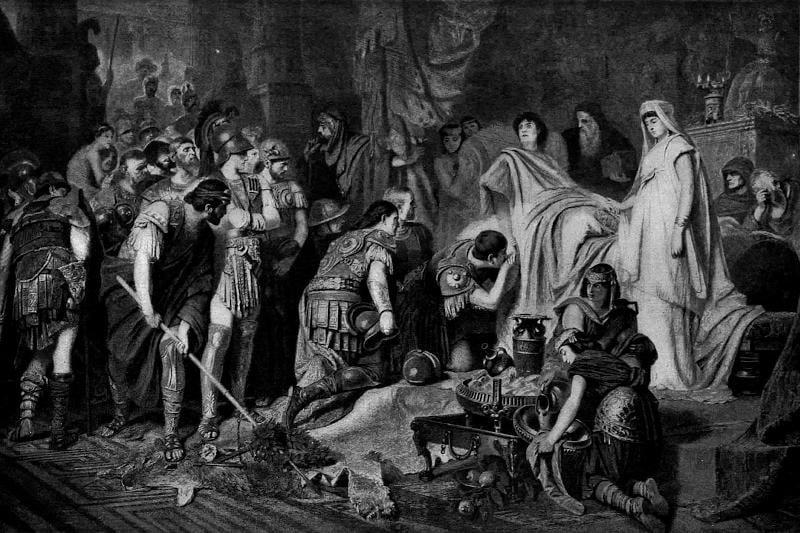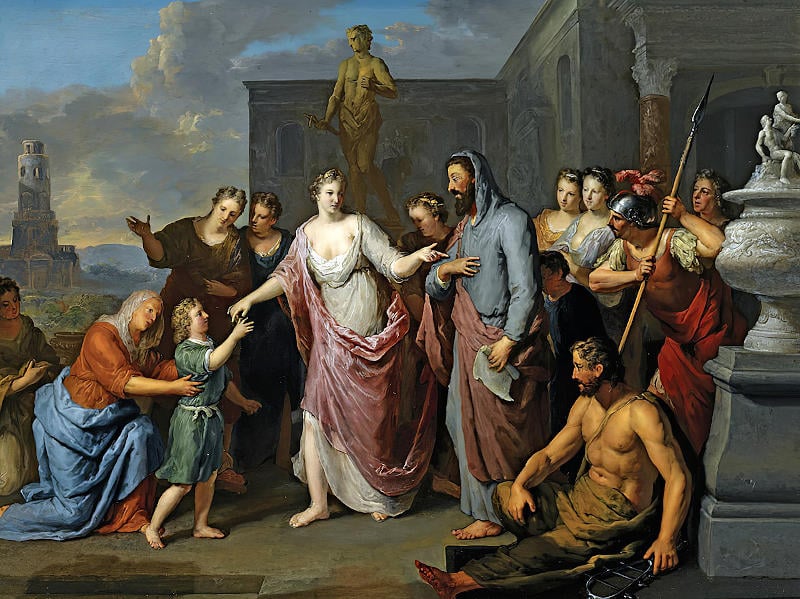
“The First War Between Women”: Olympias and Adea Eurydice
The earth turned on its axis the day Alexander the Great (356-323 BCE) died. Notorious for his unrestrained aggressivity and hard drinking, it should have come as no surprise to the Greeks that Alexander the Great would not live to see old age. Yet when the warrior king died at the age of thirty-two, it left a power vacuum the likes of which the ancient world had never seen, resulting in widespread unrest and turmoil throughout Alexander’s vast empire. His son, Alexander IV, by Roxane, his first wife, was born posthumously; thus, at the time of Alexander’s death, his gender was unknown, and Alexander’s half-brother—Arrihidaeus—was cognitively impaired, therefore permanently considered a minor and his next closest male heir.
- Female Contenders For Alexander’s Crown: Cynane, Adea, Olympias
- Which Mysterious Macedonian Royal Was Buried At Amphipolis?
Due to the absence of a designated heir and the widely held belief that the Great Conqueror’s dying wish was to leave the empire “to the strongest,” chaos enveloped both the Macedonian court and his troops in Babylon. It was inevitable that his generals, who were formally Alexander's "Successors," would quarrel with one another over which of them should lead. This series of conflicts to control portions of Alexander’s empire was an era known as the War of the Diadochi (Successors) and lasted from 323 BCE-281 BCE. Eventually, the Successors grudgingly backed Alexander's son (if he were to have one), but the Macedonian soldiers wanted Arrhidaeus to be king and threatened mutiny if the Successors disagreed. Before the empire was carved into what would become several major kingdoms, the notorious “Compromise of Babylon” was proposed where two kings—neither of them a fully functional adult—reigned.

The death of Alexander the Great by Karl von Piloty. (Public Domain)
As a consequence of this implausible arrangement, two women—Olympias (375-316 BCE) and Adea Eurydice (337-317 BCE)—each representing separate branches of the hallowed Argead dynasty—engaged in an improbable battle for sovereignty. Because succession passed through the male line, in Macedonia women wielded power only through proxy. While women might influence choices and hold important offices, their authority was reliant on their male relatives. Due to the lack of male heirs, Argead women often played key roles behind the scenes, forming strategic alliances through marriage and kinship to ensure their voices were heard and their interests protected in a realm that sought to marginalize them. By harnessing their intelligence and political savvy, Olympias and Adea Eurydice sought to secure their lineage's claim to the throne and maneuver within the constraints of a male-dominated society where they were unable to take on direct leadership roles, such as military command. In what Greek historian Duris calls "the first war between women," this article delves into the unlikely circumstances surrounding a battle in which two female leaders commanded opposing armies in a struggle for sovereignty. Some history about these two women is required before exploring the powerplay behind this clash.
Wife of Philip II and overzealous mother to Alexander the Great, Olympias, was a descendant of the Aeacid dynasty of Epirus (in today’s northwestern Greece and southern Albania). Not only was she a fanatical follower of a snake-worshiping Dionysian sect, but she also maintained that Alexander was divine—the result of a coupling between herself and Zeus, the lord of the gods. Fraught from the start, Olympias' relationship with Philip was indifferent at best; she was separated from him at the time of his assassination and was widely suspected of being a driving force behind it. Despite being one of Philip's seven wives, Olympias was one of only three to bear a male heir, the youngest of whom she killed with her bare hands, according to the ancients.
Although Olympias was more influential and well-known, Adea Eurydice’s claim outranks not just Olympias' but also Alexander's. Adea, whose maternal grandfather was Philip II, was a double Argead princess; Adea's mother, Cynane, was Alexander's half-sister and the daughter of Audata, Philip's Illyrian wife, while Adea's paternal grandfather was Perdiccas III, who was Philip's predecessor and elder brother. After Perdiccas III died, Philip usurped the throne from Adea’s father, Amyntas, who was a child at the time. In due course, Philip saw his nephew Amyntas as no threat and even arranged a marriage between Amyntas and his daughter Cynane—Adea’s parents. When Alexander assumed the throne, however, he felt otherwise and had Amyntas summarily executed. Adea’s final claim to the Argead throne was through her husband, Arrhidaeus, Alexander’s half half-brother.
Although they represented competing branches of the Argead dynasty, when Alexander was alive, these two women may not have seen each other as a threat. That changed, however, after his death, when the world flipped on its head. In 322 BCE, Adea entered the battle for sovereignty even while the Successors were vying with each other over who should lead. She and her mother, Cynane—with a more demonstrable claim to the throne than any of the Successors—raised an army specifically to set up the marriage between fifteen-year-old Adea and King (Philip) Arrhidaeus. Arrhidaeus’ name was changed to Philip Arrhidaeaus after he ascended the throne. After Alexander had killed her husband, Amyntas, Cynane's animosity for the Alexandrian line of the Argead family ran deep. Upon his death, Cynane recognized an opportunity to assume her branch’s claim to the throne. As Philip II's daughter and half sister of Alexander the Great, she successfully recruited an army that dodged troops in Macedonia and besieged the Macedonian regent on its way to a clash with the Macedonians in Asia.

Olympias presenting the young Alexander to Aristotle by Gerard Hoet. (Public Domain)




